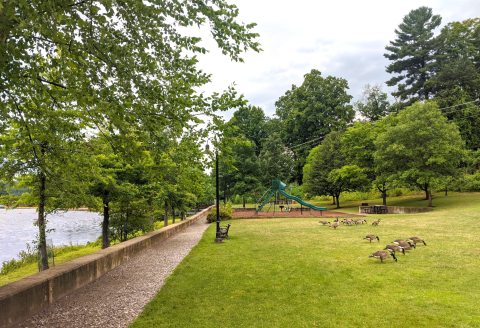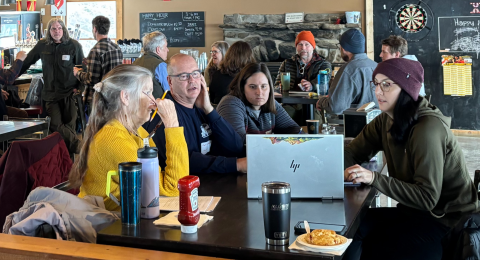Getting to Work with DIRT
On a snowy Saturday in mid-February, individuals from over twenty groups, organizations, and municipalities from the greater Franklin-Northfield-Tilton “Foothills” region of New Hampshire gathered to participate in the Regional Trails and Recreation Work Session, a key component of the Developing Interconnections for Regional Trails (DIRT) project. The main purposes of this session were to collaborate and connect, share information and resources, and break out into work groups to address goals in several key areas that will better leverage assets and build capacity for regional trails in central New Hampshire. These key areas to focus on during the work session included:
- developing a regional mapping and signage strategy to communicate the public trails and outdoor recreation assets in the region
- leveraging online tools to highlight information about regional trails, addressing different abilities and types of recreational use
- producing items to support regional branding and promotional efforts
In attendance were representatives from trail organizations, outdoor recreation associations, recreation businesses, nonprofits, and municipal planning and conservation boards and committees, along with several other interests. Specialists representing the Community and Economic Development team and Natural Resources team from UNH Extension, along with individuals from the Lakes Region Tourism Association and Foothills Foundation, provided several presentations that sparked engaging discussions and guided the focus of the work session.

The Foothills Region offers a wealth of parks, trails, and recreation areas, which Foothills Foundation hopes to connect through trail linkages and collaborative promotion.
Presentations included a variety of existing tools and resources. Mark Hayes and Cari Bernash, both from Highland Mountain Bike Park and the Foothills Foundation, discussed the importance of a connected and accessible network of trails and recreation opportunities in the region. They shared with the group some of the resources that recreation-focused consultants from SE Group had produced when working with Foothills in recent years. Emma Tutein from the UNH Extension Natural Resources team provided an in-depth overview of Trail Finder, a web-based platform that provides trail maps and information and also highlights trailside services, such as bike shops and lodging. Amy Landers, Executive Director of the Lakes Region Tourism Association, presented on the resources available to help bolster branding and advertising of assets in the region. These presentations sparked engaging discussions, guided the productive flow of the work session, and helped ensure everyone remained focused and aligned on the day’s objectives.
After these presentations, attendees broke into three groups with each focused on brainstorming, developing action items, and starting work in each of the areas of focus: 1) media and communications to promote existing recreation and trail assets and their sustainable use, 2) mapping strategies to cohesively present the region’s existing trails, and 3) integration of an existing regional recreation and tourism asset inventory into the development of an improved website. Each group was able to make significant headway in starting discussions in each of these areas, resulting in a rich roadmap to keep work moving forward.
In the big picture, the UNH DIRT project strives to make lasting impacts in the Foothills region and beyond. All workshop attendees are requested to participate in survey research and some will also take part in in-depth interviews. Research findings will help guide the development and effectiveness of future recreation planning collaborations across New Hampshire and potentially in other states, too, as the team of Extension specialists and UNH faculty share ideas and findings with colleagues in their national networks.
The Developing Interconnections for Regional Trails (DIRT) project is a collaboration between UNH Extension staff, UNH faculty, and external nonprofit and agency partners, supported by the UNH Collaborative Research Excellence (CoRE) Initiative. For more information about DIRT, please visit https://sites.usnh.edu/dirt/.


